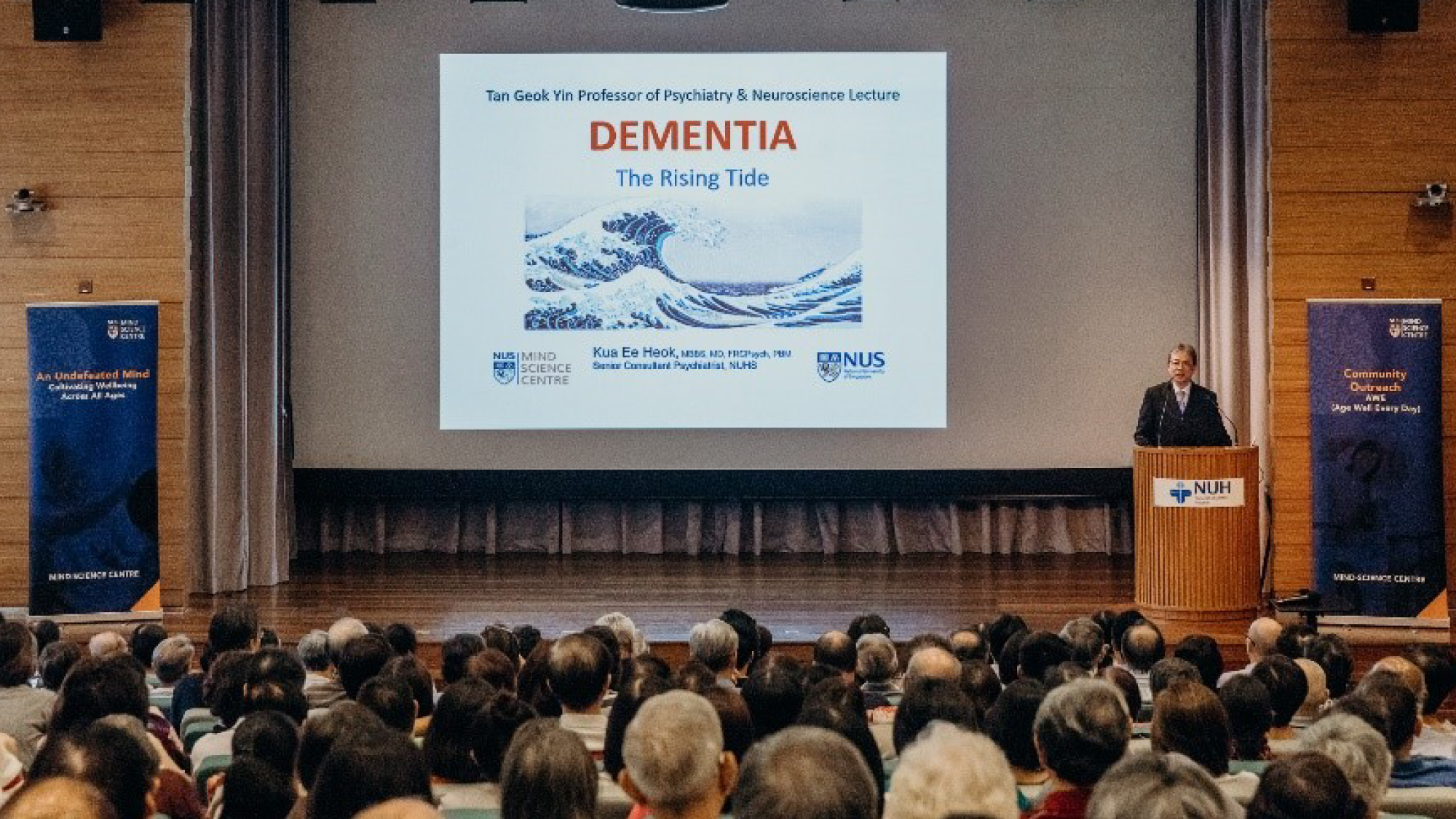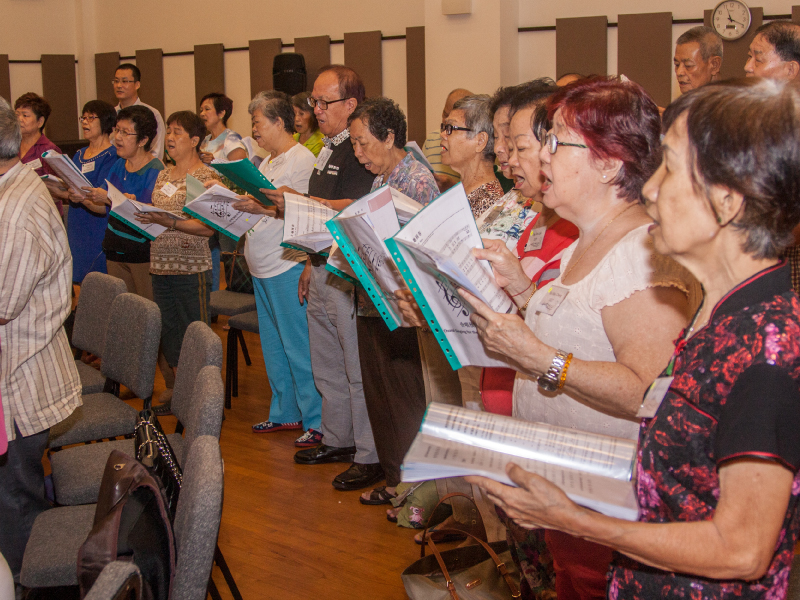Ensuring Mental Health for All
The NUS Department of Psychological Medicine celebrates 40 years of education and research
In the past 40 years, much progress has been made in the field of psychiatry in Singapore. We have learnt more about the local mental health landscape and understood how our unique cultural and social issues impact the practice of psychiatry. At the heart of academic psychiatry lies the NUS Yong Loo Lin School of Medicine Department of Psychological Medicine. Started in 1979 with a small team of six people, we now have more than 30 academic, research and administrative staff working to push the boundaries of research and education in psychiatry.
The pioneering members of the Department were enthusiastic in research, and there was rapid development in this area. The founding Head of Department, Dr Tsoi Wing Foo, pioneered many studies in schizophrenia and transsexualism. Since then, research in the Department has branched out in numerous directions, ranging from looking into acute conditions to exploring how we can preserve the mental health of the well or at-risk populations. Our researchers have collaborated with numerous organisations to look into acute conditions such as depressive disorders, obsessive-compulsive disorder and schizophrenia to explore different aspects of these conditions, such as the neurobiological basis of mental illness.
Studying the ageing mind
In 1986, the NUS Department of Psychological Medicine was one of three centres selected for the World Health Organisation Global study of Dementia in Asia. The Department was also one of the three centres in NUS to be nominated as WHO research centres. The first study on dementia in Singapore was published in 1990, and this study was selected to be presented at the World Forum on Mental Health at United Nations in New York in 1999. The Department is currently the only department in Singapore that has been invited by the United Nations to speak in a World Forum.
Through the years, research in the elderly population has grown in significance due to Singapore’s ageing population. Thus, long-term cornerstone projects such as the Gerontology Research Programme and the Dementia Prevention Programme were established to conduct multi-disciplinary and collaborative research on a wide range of themes in gerontology, spanning the basic, clinical and behavioural sciences.
The Gerontology Research Programme, currently headed by Associate Professor Ng Tze Pin, has looked into various aspects of mild cognitive impairment and dementia. For instance, the Singapore Longitudinal Ageing Study (SLAS) has studied the epidemiology of various conditions in Singaporean elderly for the past 15 years. Various interventions have been examined to see if these conditions can be prevented or attenuated, and more than 180 scientific papers have been published.
Professor Kua Ee Heok, who has been with the Department since its very early days, has spent the past 38 years looking into various aspects of elderly psychiatry. “The research we have done for dementia prevention tells us that there is the possibility that we can prevent or delay the onset of dementia,” he related, “and this would be tremendous, because the research is now translated to the community.”
An Undefeated Mind: The Mind-Science Centre
More than a decade ago, the NUS Mind-Science Centre (MSC) was conceptualised by Professor Kua, Mr Wee Sin Tho, and Associate Professor Goh Lee Gan. It was to be a Centre of Excellence dedicated to research on factors that contribute to mental resilience, and to explore how social interventions contribute to the well-being of the various populations. The first project embarked upon was the Jurong Ageing Study (JAS), which looked at ageing in a cohort of elderly individuals in the western population of Singapore. The findings from JAS have been translated to the Age Well Everyday Programme, one of the key flagship programmes of the MSC.
Associate Professor John Wong, current Head of Department as well as the Head of the MSC, explained that the Centre is devoted to research in mental resilience across the age continuum. “The Mind-Science Centre looks at upstream prevention and programme development to serve the mental well-being of the well population as well as the at-risk population,” he said.
For example, the Singapore Youth Resilience Scale (SYRESS) has been developed and validated as part of an effort to better characterise factors that contribute to tenacity in our school-going children. Research in our elderly population has continued, with various interventions such as choral singing, art therapy, horticultural therapy, and music reminiscence being studied to see how mental health can be improved. Indeed, much more research needs to be done so that we can build psychologically strong individuals, families and communities.

Prof Kua Ee Heok delivering the Tan Geok Yin Professor of Psychiatry and Neuroscience Lecture in April 2018.

Choral singing is being evaluated by the Jurong Ageing Study to see if it can help the elderly at high risk of dementia to slow down or even prevent the onset of disease.
Teaching the next generation
In addition to research, the Department of Psychological Medicine also provides undergraduate training in psychiatry to fourth year medical students. Prior to 1972, the psychiatry teaching programme for medical students at the University of Singapore consisted of 20 hours of lectures, followed by a visit to the Woodbridge Hospital. Later, the clinical postings were increased progressively to two weeks, and subsequently four weeks. A longer clinical posting was needed to help the students develop a better understanding of mental health issues.
Today, our students undergo a six-week rotation through the Department, where they are immersed in the world of psychiatry and equipped with skills to engage with psychiatric disorders. Dr Cyrus Ho, the Deputy Undergraduate Director shared that while most medical graduates may not choose to specialise in psychiatry, it is still essential for them to recognise that mental and physical health are intrinsically linked. “As many of them become generalists, or specialised in other disciplines, we make a deliberate effort to train them, and to expose them to a wide variety of medical conditions that interplay with psychiatry,” he said.
The Department has received the Clinical Training Excellence Award for four consecutive years – it is a testament to the efforts of our educators and their commitment to educating the next generation of doctors and equipping them with the necessary knowledge and skills to identify, treat and support our patients with mental health conditions.
The Department is also highly involved in postgraduate training, for both our residents and specialists. The Psychiatry residency training programme is a dynamic enterprise comprising a clinical curriculum that allows the residents to rotate through multiple care settings. In addition, the Department has also been hosting the NUS Master of Medicine (Psychiatry) programme since 1985, allowing specialists to further develop their skills and knowledge base in important areas of psychological medicine.
The Department has also hosted conferences to share its work and stimulate further discussion of pertinent topics in psychiatry. In 2014, the inaugural NUS Academic Psychiatry Conference was launched, with international collaborators such as the Harvard Medical School and the University of Cambridge.
Later this year, the fifth Conference in the series will be held to look at Resilience Across the Age Continuum.
This Conference brings together a dynamic panel of international speakers who will be able to deliver insights into the challenges and prospects of building resilience from the young to the old.
A partnership for our patients and community
The support of our counterparts working at the National University Hospital have also been essential in our continuous progress. Ward 33, the inpatient psychiatric ward, and the Neuroscience Clinic are staffed by the Department’s psychiatrists, residents, psychologists and other allied health professionals. The Department also hosts many different programmes looking into various aspect of community mental health, such as the Women’s Emotional Health Service and REACH (West), to name a few. Many of the doctors have offered their time and expertise in helping to teach and supervise our medical students. Our psychiatrists and psychologists have often also given valuable input by relating real life issues that impact translational research, as they best understand the intricacies of dealing with mental health conditions.
In the years to come, the NUS Department of Psychological Medicine will strive to excel in research and education. Interest in mental health conditions has increased over the years, leading to more willingness to learn and less readiness to stigmatise those struggling with mental health issues. Our efforts to broaden the field of psychiatry and to educate our next generation of doctors will sow the seeds for better mental health outcomes for all. Here’s to another fruitful 40 years!

The Department of Psychological Medicine 38th Anniversary photo.
